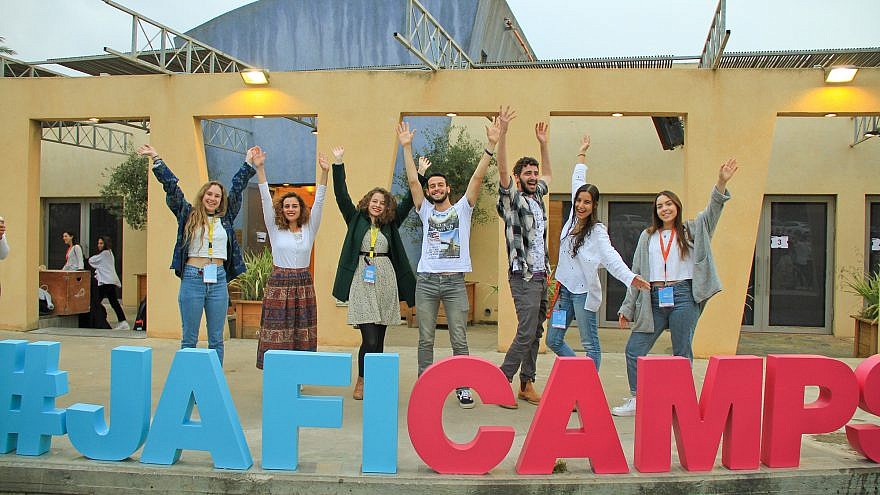Kibbutz Shfayim is simply gorgeous. With palm trees and Hebrew signs everywhere, it doesn’t have the feel of an American summer camp.
Yet somehow, with enough American camp staff, small bunk-like guest houses and goofy ice-breaker games being conducted in circles all over the lawn, it’s actually quite easy to feel transported. Throw in a performance by Rick Recht teaching American-accented Hebrew words in song on a stage, and it really feels like you have been beamed over to any one of the 206 American camps that bring in Israelis to work as camp counselors through the “Shlichim” program.
The Jewish Agency hosts and facilitates several such training events throughout March and April for the 1,400 young adults who will leave in June for the United States. Each four-day-long training seminar consists of ice-breakers, simulation of the “American camp experience,” introductions to the national staff, hearing from JAFI leadership and camp directors, learning about how to identify educational opportunities, how to work with children, and how to bring one’s personal story and Israel’s national story to the camp experience.
The seminar is also full of opportunities for participants to get to know each other and get excited about the summer. It is a project that demonstrates inter-organizational cooperation in the Jewish world at its best, bringing together the Jewish Agency for Israel, Young Judaea, the Union for Reform Judaism, the Ramah Camping Movement, Habonim Dror North America, the Association of Independent Jewish Camps and the JCC Association of North America.
The dedication of North American Jewish camp professionals to the shlichim program is demonstrated by the large number of American camp staff who fly to Israel specifically for these training days. American camp professionals who attended were emphatic about the tremendously positive impact of including Israelis on their staff.
Tomer Moked, Israeli assistant director of Tamarack Camp Maas in Michigan, said “Israelis bring a spice and a passion and an energy to camp. They have a strong work ethic, and camp benefits from their skills and maturity post-army.”
The Foundation for Jewish Camp has long been an outspoken advocate for the J-1 Camp Counselor and Summer Work Travel (SWT) program, which enable the shlichim cultural exchange to take place. Over the past two years, the status of the J-1 Visa has been in question in the United States, and FJC has worked closely with the American Camp Association to lobby for the protection of the program.
Jeremy J. Fingerman, CEO of the Foundation for Jewish Camp, said “international staff, and particularly the Israeli shlichim, promote global Jewish peoplehood. These wonderful team members make an impact on our campers and counselors alike—broadening horizons, sharing cultures and adding new energy, languages and perspectives to our community. In particular, the presence of Israeli shlichim is essential to the mission of American Jewish camps in having a profound impact on young Jewish people by nurturing a strong personal connection to Israel in the next generation of Jewish leaders.”
The participants mostly come to the program via word of mouth from alumni all over the country. They come primarily to “have fun and meet people.”
In a room of Israelis from all parts of the country and exhibiting a wide range of ages, who were jumping up and down and clapping hands to a very American version of “Hinei Ma Tov,” JAFI chairman Isaac Herzog brought this point home: “You are going on this adventure to give American campers a taste of Israel, as ambassadors of Israel, to give them a sense of what Israel is like. But you are coming back as ambassadors to Israel. To bring some of the unique vibrancy of the American Jewish experience back to Israel.”
In the wake of this year’s GA theme “Let’s Talk,” there are many efforts to find ways to bridge the widening gap of culture and understanding between Israel and Diaspora Judaism.
The shlichim program is one of those initiatives. By working directly with young adults, it catches Israeli and Americans at a time in their lives when they are open to new ideas and cultures. It’s an investment in the next generation of Israeli and Diaspora Jews in conversation together.


























